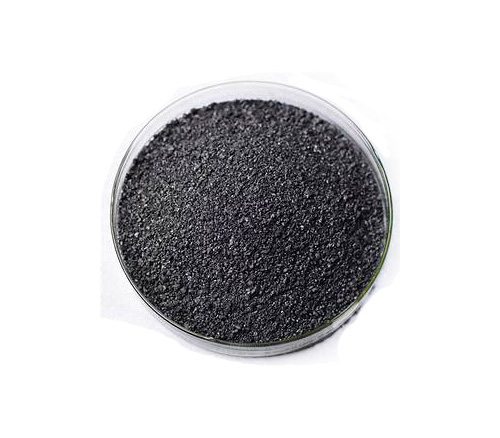- Home
- Petroleum coke
Petroleum coke
Product Description
Petroleum coke, abbreviated coke or petcoke, is a final carbon-rich solid material that derives from oil refining, and is one type of the group of fuels referred to as cokes. Petcoke is the coke that, in particular, derives from a final cracking process—a thermo-based chemical engineering process that splits long chain hydrocarbons of petroleum into shorter chains—that takes place in units termed coker units.
In petroleum coker units, residual oils from other distillation processes used in petroleum refining are treated at a high temperature and pressure leaving the petcoke after driving off gases and volatiles, and separating off remaining light and heavy oils. These processes are termed "coking processes", and most typically employ chemical engineering plant operations for the specific process of delayed coking.
The chemical and physical characteristics of petcoke are a function of the crude oil and refining technology used by the refinery. Petcoke can be hard or relatively soft. Physically, petcoke can resemble large sponges with numerous pores, or it can resemble small spheres, ranging in size from a grain of sand to a large marble. Chemically, petcoke can include a variety of elements and metals in a wide range of concentrations. Depending on these physical and chemical characteristics, petcoke is typically used in either an energy application, as a source of British Thermal Units (BTUs) or in an industrial application, as a source of carbon.
Calcined Petroleum coke comes from delayed coke which extracted from oil refinery. Although calcined petroleum coke contains high content of sulfur and nitrogen, its price advantage makes it still use widely during steel-making and founding as a kind of carbon additive.production of graphite electrode, carbon paste products, carborundum, food-grade phosphate Industry and calcium carbide industry, metallurgical industry, one of the most widely used is graphite electrode.
Types
There are at least four basic types of petroleum coke, namely, needle coke, honeycomb coke, sponge coke and shot coke. Different types of petroleum coke have different microstructures due to differences in operating variables and nature of feedstock. Significant differences are also to be observed in the properties of the different types of coke, particularly ash and volatile matter contents.
Needle coke, also called acicular coke, is a highly crystalline petroleum coke used in the production of electrodes for the steel and aluminium industries and is particularly valuable because the electrodes must be replaced regularly. Needle coke is produced exclusively from either fluid catalytic cracking (FCC) decant oil or coal tar pitch.
Honeycomb coke is an intermediate coke, with ellipsoidal pores that are uniformly distributed. Compared to needle coke, honeycomb coke has a lower coefficient of thermal expansion and a lower electrical conductivity.
- CONTACT US +86-13526138080 mingshancoke@163.com China Sales Office: R1108, 11TH FLOOR, No.8 BUILDING, HUAQIANG CENTER, ANYANG, CHINA. LONDON OFFICE: RM101, MAPLE HOUSE, 118 HIGH STREET, PURLEY LONDON, ENGLAND, UNITED KINGDOM, CR8 2AD.

- Production Capacity 1. Metallurgical coke (powder) production capacity of 100,000 tons/month 2. Silicon carbide ball processing 6000 tons/month 3. Semi coke production capacity of 5,000 tons/month 4. Ferrosilicon processing capacity of 50,000 tons/month Related Products 1. High Carbon Ferro Silicon 2. Silicon Metal 3. Silicon Metal Powder 4. Silicon Briquette
- GET IN TOUCH
 العربية
العربية Français
Français Español
Español English
English




